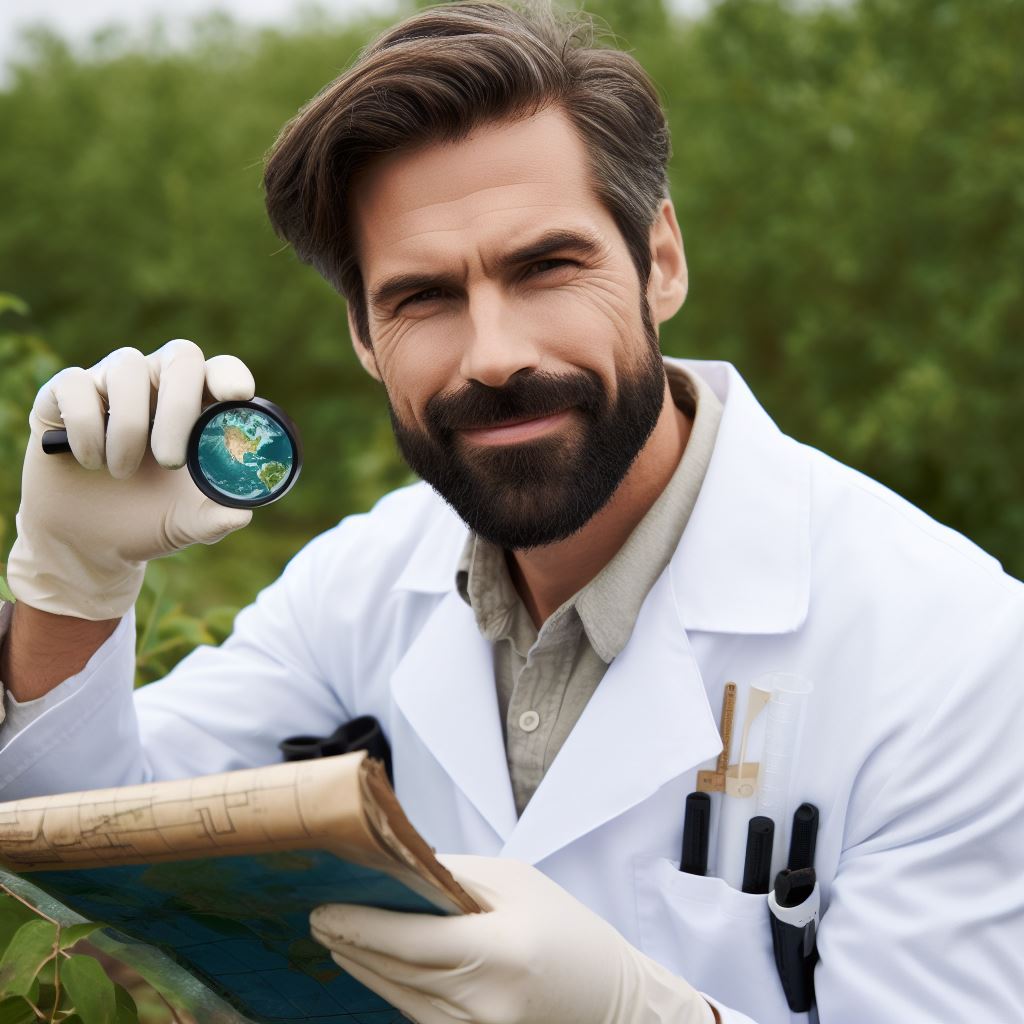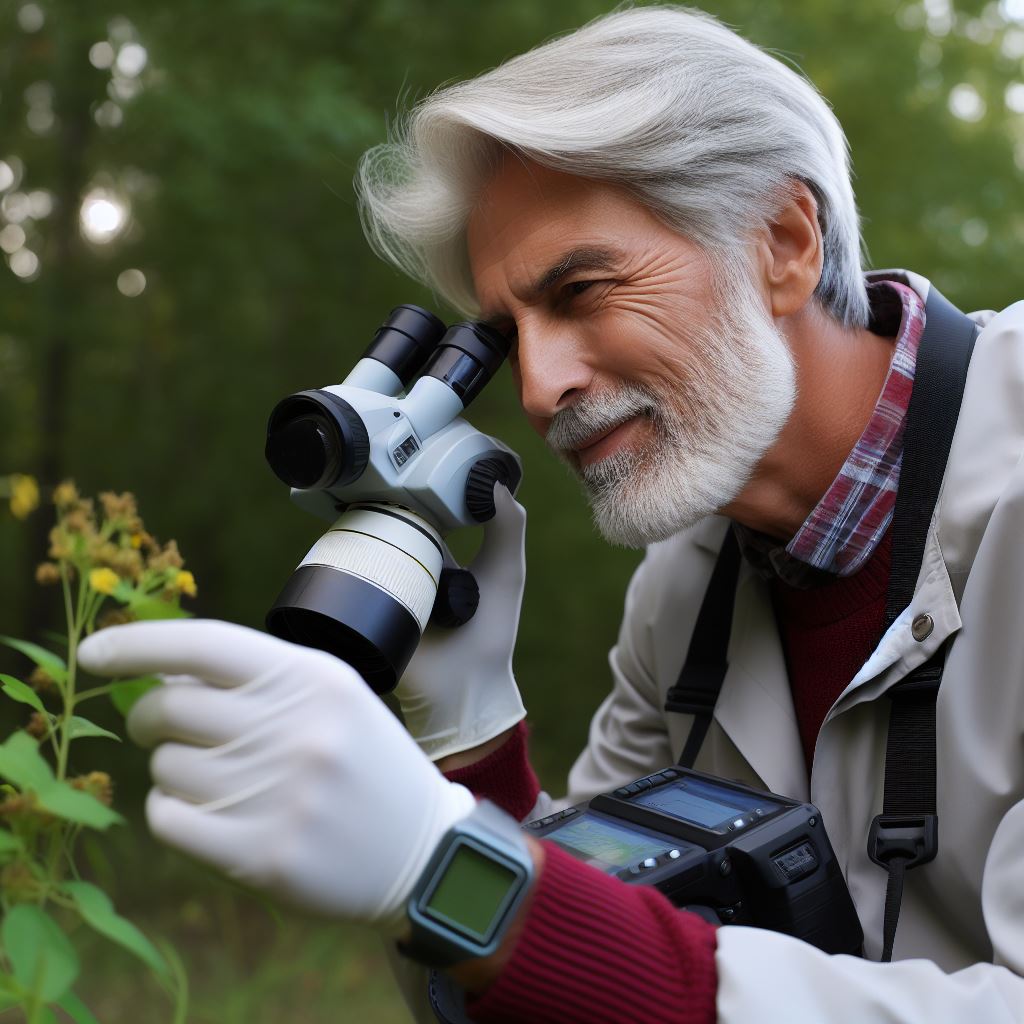Introduction
As a US-based biologist, my day starts early in the morning. I wake up to the sound of birds chirping outside my window, excited about the new discoveries I might make today.
After a quick breakfast, I head to the laboratory.
In the lab, I put on my lab coat and gloves, ready to conduct experiments. I start my day by checking the progress of ongoing projects and reviewing latest research in my field. Staying updated is crucial to my work.
Next, it’s time for data analysis. I spend a significant portion of my day analyzing data collected from previous experiments.
This involves using sophisticated software and statistical tools to make sense of the numbers and draw meaningful conclusions.
Apart from data analysis, I also spend time designing and planning future experiments. This requires careful consideration of variables, controls, and ethical guidelines.
Each experiment must be meticulously designed to ensure accurate results.
In addition to lab work, I often attend meetings and conferences to network with fellow scientists and share my findings.
These events provide valuable opportunities for collaboration and staying updated on the latest advancements in my field.
Before ending my day, I make sure to document all my work in detailed reports and publications.
This ensures that my findings can be shared with the scientific community and contribute to the collective knowledge.
Overall, being a biologist is an exciting and fulfilling career. It involves a variety of tasks, from conducting experiments to analyzing data and communicating findings.
Every day presents new challenges and opportunities for discovery, making this profession truly rewarding.
Morning Routine
Wake up and get ready for the day
- Set alarm, wake up at 6:30 am, and start the day with a refreshing shower.
- Choose a professional yet comfortable attire, ensuring it aligns with the lab safety guidelines.
- Follow a skincare routine to maintain a healthy complexion in the laboratory environment.
- Prepare a packed lunch and ensure it contains a balanced mix of proteins, carbs, and healthy fats.
Have a healthy breakfast
- Start the day with a nutritious breakfast to fuel the brain and body.
- Prepare a bowl of whole-grain cereal topped with fresh fruits and low-fat yogurt.
- Or opt for eggs, whole wheat toast, and a cup of green tea for an energy boost.
- Enjoy the meal mindfully, savoring each bite and appreciating the nourishment.
Review and respond to emails
- Open the inbox and quickly skim through the emails to prioritize urgent tasks.
- Respond to important emails promptly, providing concise and informative replies.
- Address any inquiries or concerns from colleagues, collaborators, or superiors.
- File and organize emails, ensuring important information is easily accessible for future reference.
Check news and scientific updates relevant to current research
- Browse reliable scientific websites and journals to stay updated on the latest breakthroughs and discoveries.
- Read articles, research papers, and reviews relevant to ongoing projects and experiments.
- Take note of any new methodologies, techniques, or equipment that could enhance research efficiency.
- Stay informed about funding opportunities, conferences, and events related to the field.
Prepare necessary equipment and materials for the day’s tasks
- Check the research plan and gather the required laboratory equipment and materials.
- Clean and sterilize the equipment to ensure accurate and uncontaminated results.
- Organize the lab bench, ensuring it is clean, clutter-free, and ready for experimentation.
- Label the necessary containers, tubes, and slides with appropriate identifiers for easy identification.
Lab Work
Conduct experiments and collect data
As a biologist in the US, one of the main tasks is to design and perform experiments in the laboratory.
This involves setting up equipment, following protocols, and carefully manipulating samples or organisms to obtain data.
Analyze data and write reports
Once the data is collected, the next step is to analyze it using statistical software and other tools.
This involves interpreting the results, identifying patterns or trends, and drawing conclusions. Biologists also write reports to document their findings.
Collaborate with colleagues and discuss findings
Biologists often work in teams or collaborate with other researchers. They regularly engage in discussions with colleagues to share their findings, exchange ideas, and seek feedback.
These interactions contribute to the advancement of scientific knowledge.
Attend lab meetings or conferences to present research progress
To keep everyone updated, biologists attend regular lab meetings where they present their research progress and receive input from their peers.
They may also have the opportunity to present their work at conferences, sharing their findings with a broader scientific community.
Stay updated on the latest research in the field
Being a biologist entails staying informed about the latest advancements in the field.
This includes regularly reading scientific literature, attending seminars, or participating in online forums to keep up with new discoveries, techniques, and methodologies.
Read: Fields of Specialization: Niche Areas for Biologists in the US
Fieldwork
Plan and organize field trips
Field trips are an essential part of a biologist’s job as they provide firsthand experiences in different ecosystems and habitats. Biologists meticulously plan and organize these trips to ensure their success.
Collect samples or observe wildlife in their natural habitat
During field trips, biologists engage in hands-on activities such as collecting samples of plants, animals, or environmental elements.
They also observe and study wildlife in their natural habitats to gather important data.
Record and document observations
Accurate and detailed documentation is crucial for biologists. They keep meticulous records of their field observations, noting down species identification, behavior patterns, and any significant findings they come across.
Preserve collected samples for further analysis
Biologists take great care in preserving the samples they collect during fieldwork.
These samples can include organic matter, genetic material, or environmental data and are later subjected to various analyses in the laboratory.
Take appropriate safety precautions while working outdoors
Outdoor fieldwork often involves risks, and safety is paramount. Biologists undertake necessary precautions, such as wearing protective gear, carrying first aid kits, and being aware of potential hazards like extreme weather conditions or dangerous wildlife.
Fieldwork is an exciting and essential aspect of a biologist’s profession.
It allows them to explore new environments, conduct real-time research, and gather valuable data that contributes to scientific knowledge and conservation efforts.
Read: Top Universities for Aspiring Biologists in the USA
Transform Your Career Today
Unlock a personalized career strategy that drives real results. Get tailored advice and a roadmap designed just for you.
Start NowOffice Work
Write research proposals or grant applications
In addition to conducting experiments and analyzing data, office work is an integral part of a biologist’s routine tasks.
One of the primary responsibilities involves writing research proposals or grant applications. This crucial process requires careful consideration and planning to secure funding for scientific projects.
Analyze data and write scientific papers for publication
Another essential task in the biologist’s office work is analyzing the data collected during experiments.
This involves using statistical tools and software to extract meaningful conclusions from the results obtained.
After analyzing the data, biologists then write scientific papers detailing their findings and submit them for publication in reputable journals.
The ability to effectively communicate research findings is vital for the advancement of scientific knowledge.
Review relevant literature and stay up-to-date with scientific advancements
To stay at the forefront of their field, biologists dedicate time to reviewing relevant literature and staying up-to-date with scientific advancements.
This includes reading the latest research papers, attending conferences, and engaging in discussions with colleagues.
By continuously learning and assimilating new knowledge, biologists can enhance their expertise and contribute to the scientific community.
Attend virtual meetings or conferences
In the digital age, attending virtual meetings or conferences has become an essential part of a biologist’s office work.
These events allow scientists to share their research, receive feedback, and collaborate with peers from around the world.
By participating in such meetings, biologists can expand their networks, exchange ideas, and potentially form valuable collaborations.
Engage in scientific discussions with peers via online platforms
Besides attending virtual meetings and conferences, biologists also engage in scientific discussions with their peers through online platforms.
These platforms provide a space to exchange ideas, seek advice, and collaborate on research projects.
By actively participating in scientific discussions, biologists can broaden their perspectives and contribute to the collective growth of knowledge.
In review, office work is an integral part of a biologist’s routine tasks, alongside laboratory experiments and fieldwork.
Writing research proposals, analyzing data, writing scientific papers, reviewing literature, attending virtual meetings, and engaging in scientific discussions are all essential components of an active biologist’s work life.
By effectively managing office work, biologists can contribute to the advancement of scientific knowledge and make significant impacts in their respective fields.
Read: Job Outlook: Future Demand for Biologists in America

Find Out More: Future of Nuclear Science and Technology
Collaboration and Networking
Attend meetings or events with other biologists
As a biologist, it is important to actively participate in meetings and events that bring together professionals in the field.
This allows you to stay updated with the latest research, advancements, and trends in biology.
By attending these gatherings, you have the opportunity to engage in discussions with fellow biologists, share your own work, and learn from others.
It also provides a platform to build connections and foster collaborations for future projects.
Network with professionals in related fields
Besides connecting with other biologists, networking with professionals in related fields can broaden your perspective and open up new possibilities for interdisciplinary research.
Attending conferences or joining organizations that bring together individuals from diverse backgrounds can facilitate collaborations across disciplines such as chemistry, genetics, ecology, or medicine.
Collaborate on research projects or publications
Collaboration is at the heart of scientific progress. By partnering with other biologists or researchers from different areas, you can combine expertise and resources to tackle complex scientific questions.
Collaborative research projects often lead to more comprehensive and impactful results.
It also allows for a sharing of knowledge, methods, and data, leading to a more efficient and effective scientific community.
Share knowledge and expertise through presentations or workshops
Being able to effectively communicate your research findings is crucial in the field of biology.
Presenting your work through conferences, seminars, or workshops allows you to share your knowledge and expertise with a broader audience.
Additionally, by presenting your work, you can receive feedback, suggestions, and constructive criticism from other experts in the field. This can contribute to refining your research and enhancing its impact.
Seek opportunities for mentorship or partnerships
Continual growth and learning are important for any biologist. Seeking mentorship from experienced scientists in your field can provide valuable guidance in your career development.
Mentors can provide insights, advice, and support in navigating the challenges and opportunities that come with being a biologist.
Additionally, forming partnerships with mentors or colleagues can lead to collaborative projects or grant opportunities.
To find mentors, you can reach out to professors, senior researchers, or leaders in your field.
Building strong relationships with mentors can have a significant impact on your professional and personal growth.
In essence, collaboration and networking are essential aspects of a biologist’s routine tasks.
By attending meetings, networking with professionals, collaborating on projects, sharing knowledge, and seeking mentorship, you can advance your career and contribute to the field of biology.
Transform Your Career Today
Unlock a personalized career strategy that drives real results. Get tailored advice and a roadmap designed just for you.
Start NowRead: Salary Expectations: Biologists‘ Earnings Across the States
You Might Also Like: How Virologists Are Combating Emerging Viral Diseases
Continuing Education and Professional Development
A biologist based in the US has to stay updated on the latest research techniques and technologies. This is crucial to ensure their work remains relevant and impactful.
Stay updated on the latest research techniques and technologies
- Read scientific journals, attend conferences, and participate in scientific forums to keep up with advancements.
- Follow reputable researchers and institutions online to stay informed about breakthroughs and new methodologies.
- Regularly communicate with colleagues and collaborators to exchange knowledge and stay abreast of new developments in the field.
Attend workshops, webinars, or seminars for skill enhancemen
- Participate in hands-on workshops to gain practical experience in using cutting-edge equipment and techniques
- Join webinars hosted by experts in the field to learn about novel approaches and advancements.
- Attend seminars to expand knowledge in specific areas of interest and engage in discussions with fellow scientists.
Pursue higher education or certifications, if desired
- Consider obtaining a Master’s or Ph.D. degree to specialize in a particular area and gain in-depth knowledge.
- Explore postdoctoral positions to further research skills and contribute to ongoing scientific endeavors.
- Earn certifications related to specific techniques or methodologies, which can enhance professional credibility.
Engage in professional societies or organizations
- Join local, national, or international professional societies relevant to the biologist’s field of expertise.
- Participate in conferences, workshops, and networking events organized by these societies to foster collaboration.
- Contribute to society publications, serve on committees, and take leadership roles to actively contribute to the field.
Mentor aspiring biologists and contribute to the growth of the field
- Offer guidance and support to students interested in pursuing a career in biology.
- Share experiences and insights with young biologists to inspire and help them navigate their academic and professional paths.
- Collaborate with educational institutions or organizations to develop programs that promote scientific literacy and knowledge.
Continuing education and professional development are vital for biologists to thrive in their careers and contribute to the advancement of scientific knowledge.
By staying updated, expanding skills, and actively participating in the scientific community, biologists can make meaningful contributions to their field and drive innovation forward.
Conclusion
In review, the routine tasks of a US-based biologist include conducting experiments, analyzing data, and writing reports.
The importance of their work in advancing scientific knowledge cannot be overstated. Biologists contribute to finding cures for diseases, understanding ecosystems, and conserving biodiversity.
It is essential for readers to appreciate the efforts and contributions of biologists. Their dedication and passion drive progress in the field of biology.
As we conclude, let’s acknowledge the hard work of biologists and support their endeavors. By valuing their efforts, we can foster a deeper understanding of the natural world and promote scientific innovation.
Embrace the fascinating world of biology and be part of the journey towards a brighter future.




